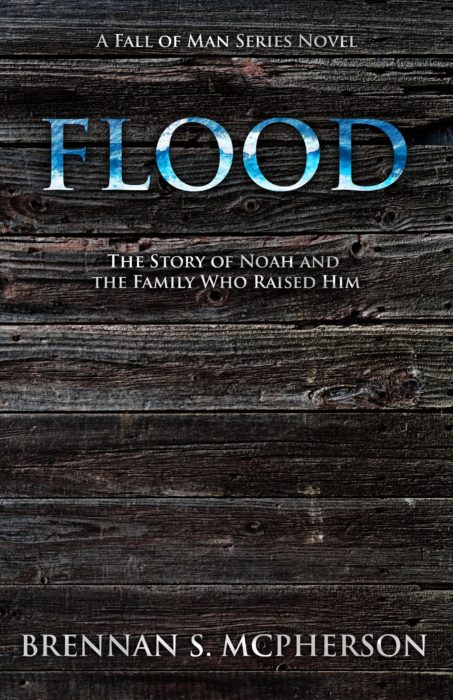Which is Greater: Faith or Truth?
If you worship truth, you’re a heathen.
In the West, many times, self-proclaimed Christians unknowingly worship verifiable fact.
But reliance on verifiable fact is entirely opposed to faith in God, whose appearance as a human is a ludicrous impossibility but for the simple exercising of faith.
Hebrews 11:6 (ESV) says:
And without faith it is impossible to please him, for whoever would draw near to God must believe that he exists and that he rewards those who seek him.
What is faith? Faith is the exercising of the imagination on God’s promises. Without the human imagination, faith is impossible, worship is impossible, and pleasing God is impossible.
This week we feature Brennan S. McPherson and his novel Flood in Lorehaven Book Clubs. Stop by the flagship book club on Facebook to learn more about this story.
Jesus said that if we’re nice only to those who are nice to us, our niceness is meaningless (Luke 6:32-36). In the same way, when we believe only in what may be proven, our belief is nothing.
Children believe implicitly. They do not find faith a hard concept to grasp. Only after being indoctrinated with scientific thought does faith become difficult.
We take that to mean children are naïve and easily fooled. But here we must caution ourselves. Because across the board, four year old’s have an easier time following Christ than thirty-year-old science majors.
Can’t you see? Isn’t it obvious?
I’m not saying we need to reject truth or verifiable fact. Accepting those is necessary and easy.
The difficult part is moving past truth and verifiable fact to actual faith in an intangible, infinite God who knows things we can never wrap our minds around, and uses them to order a universe that mostly lies beyond the cold grip of science.
If you don’t prioritize faith over knowledge, the first calamity will pummel your faith.
When pressures rise, and pain increases, reliance on intellect will be the sand you built your house on.
 This is why I write fantasy. To remind myself that the mysteries of God are greater than the little I actually understand of him, and that I must have faith in God to follow and honor him.
This is why I write fantasy. To remind myself that the mysteries of God are greater than the little I actually understand of him, and that I must have faith in God to follow and honor him.
This is why my writing fantasy is an elaborate prayer and a form of worship. Because it is a tool I use to set my heart on the mysteries of Christ.
Western adults are so terrified that fantasy will confuse children. But anyone who’s ever played make-believe with a four year old child knows that this is a silly fear.
Children know that make-believe is not real, and that is precisely why they enjoy it. Like irony, to know that something is not true and yet to act as though it is provides the purest of joys.
Until we grow older, and everyone tells us that make-believe is unhelpful and dangerous. That the imaginary worlds we loved when we were children are not only distasteful, but a waste of time.
At first, we don’t listen. But demands pile on top of demands, and we trade a sense of wonder for practical engagement with everyday life.
It’s not all bad.
We need to be diligent and faithful in our daily duties. But sometimes the dust of this world weighs heavy, and we forget that through everything, God has strung his beauty like a master weaver at the loom.
This, I think, is the primary strength in Christian fantasy: that it can so powerfully re-awaken our love for, and fascination with, God’s beauty.
If you ever wonder why certain church groups seem stale, rude, or resentful, search for a fascination with the wonders and beauty of God’s person. You won’t find it. Search for a vibrant, daily personal practice of prayer and worship. You won’t find it.
You can find theologians among the spiritually dead.
It’s not about knowledge, it’s about faith.
Without the human imagination, heart-level worship doesn’t exist.
That’s also how Christian fantasy can broaden our capacity for worship, because it broadens our imaginations.
That’s why I read it. That’s why I write it. That’s why I love it.
“Flood comes at you like a storm. There’s a simplicity to its tumult, a feral edge to its beauty.”
— Lorehaven MagazineExplore Brennan S. McPherson’s novel Flood in the Lorehaven Library.
Read our full review exclusively from the spring 2018 issue of Lorehaven Magazine!




































whee, anti-intellectualism. because feelings never steer you wrong.
I know you’re trying to be balanced, with your little bit in there about facts being important in some instances, but divorcing intentions from results is not that great an idea. “The road to hell is paved with good intentions” and all that.
No, it’s not anti-intellectualism. And I didn’t say, “in some instances.” That’s your own eisegesis. Fact is important, but not as important as faith. That’s a solidly Scriptural truth. And again, “divorcing intentions from results” isn’t written in this article. You’re reading your own presuppositions into the text. Faith is the only thing that will give you results in the Christian faith. Period. Even the demons believe and shudder. Blessings. . .
I can’t see that my interpretation of “in some instances” was all that off base.
And yeah, you weren’t talking about divorcing intentions from results, but I find that rhetoric like this is in part responsible to what is a pretty widespread problem in Christian culture, when the purity of your technical argle-bargle is more important than the results they produce (see: abstinence-only sex-ed).
I get that this was supposed to be a Happy Nice Time article, but dang this is some Christian-flavored Deepity Salad.
Well, you may not see that it was all that off base, but it is. And I have no idea what you mean by “technical argle-bargle,” nor why you refer to it being more important than “the results they produce.” What I wrote above is biblical truth, and if you need more Scriptures to tweak your perspective, I’ll provide them. It’s not a “Happy Nice Time article,” nor “Christian-flavored Deepity Salad.” The point is that we need to rely on faith more than on intellect, because in Western Christianity, we tend to rely more on intellect than on faith. And THAT is a widespread problem in Christian culture. When we live by faith (again, countless Scriptures here), we live by the power (aka results) of the Holy Spirit. It’s the opposite of what you’re thinking.
Insult and write rude comments all you want, but you’re off-base.
[Jennifer Lawrence okay yeah gif]
Lol.
Oh thank you so much for writing this! I needed to read this, God knows I needed this. Thank you God!!! I love wondering at His creation, marveling at His artwork and want to join in that, share in that breathtaking joy and beauty.
Me too! And in case any others took away from the article what Notleia did above, as a result of any failure to write clearly on my part, I hope we share in that breathtaking joy and beauty while thinking rightly about God and theology! All things in balance and according to the Scriptures. . . knowledge puffs up, but love builds up. Even better if we walk in humility and faith while having accurate knowledge.
I think I’m supposed to be offended as a 30-something engineer who loves writing fantasy? Thank you Brennan for offering an opinion that got me thinking critically about my beliefs, even if I disagreed. Usually after my pitchfork/torches moment, I’m reminded “Hey, it’s good question to ask!” What did Jesus say? Among other things, “For this purpose I was born and for this purpose I have come into the world—to bear witness to the truth. Everyone who is of the truth listens to my voice.” For believers, Jesus is objective truth. For many who don’t practice our faith, Jesus is probably at best speculative fiction.
I think it’s just the circles I’m in, but the only time I’ve heard the argument about fantasy content exposure and children is among believers. My friends of other persuasions almost couldn’t care less: as long as their kids are entertained and exposed to “good values”, they are fine with those media selections. Our Christian friends fall into two categories: those who promote whimsy and imagination as God-given expressions of creativity, but apply good parenting to ensure they steward young minds, and those who will only allow exposure to media that is entertaining, promotes good values, and explicitly ties that to Jesus; all else is denied. Of course, they struggle to keep the box closed against Pandora as time goes on and outside influences exert more power. I don’t agree with that method, but I can respect why they choose it. I know it’s a question that influences my writing and categorization (I was shocked when Amazon added me into a Teen/YA bin! Yikes!)
Again, great question to think through!
No, you’re not supposed to be offended. My father’s an engineer (a highly respected one). I’m a business grad. I love science. But we can’t, and don’t, live by truth or logic. We live by faith. The point is not faith to the exclusion of intellect. The point is to put faith in the primary, and intellect behind it. God demands we engage him with our whole person–heart, mind, body. But we have to be careful not to become fixated on intellect. It’s like the book of James–true faith begets action. True faith impacts our intellect. We can be intellectual about Christianity and theology while our hearts and spirits languish. What’s most central to the Christian faith is that we love God with everything we have. Our actions and intellectual understanding of God need to flow out of that.
What are the fruits of the spirit? Love, joy, peace, patience, kindness, goodness, faithfulness, self-control. None of those “results” are born through the intellect, but instead flow through faith via the Holy Spirit.
I agree, by the way. Basically only Christians these days prohibit fantasy, so far as I’ve seen.